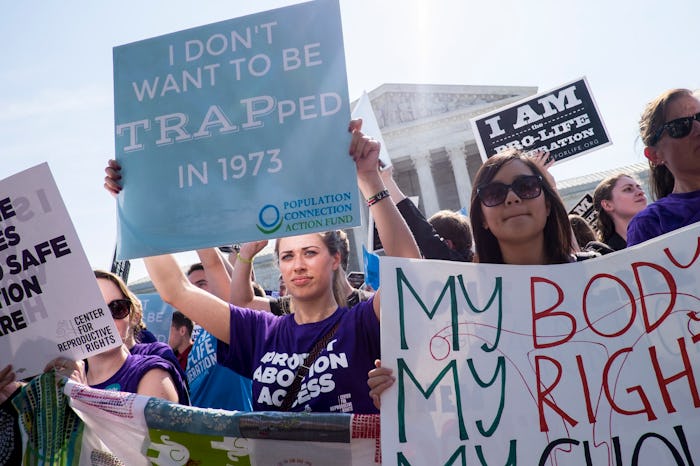News

8 Great Quotes From The Supreme Court's Abortion Ruling That Show Why Restrictions Are BS
On Monday, the Supreme Court struck down key parts of Texas's House Bill 2, a measure that would have required expensive and logistically difficult requirements for abortion clinics, effectively closing most of the ones that remain in the state. This ruling in the case of Whole Woman's Health v. Hellerstedt is an historic victory for reproductive rights, and the majority opinion definitely has a triumphant tone. The 107-page document was written by Justice Stephen Breyer and includes Justice Ruth Bader Ginsburg's glorious concurring opinion. If you need some inspiration, here are the eight best quotes from the Supreme Court's abortion ruling.
Even with the Supreme Court down one member, the justices managed to come to a clear ruling. Since the death of Justice Antonin Scalia, the Supreme Court has passed on a number of cases or found themselves at a deadlock. Not so with this case. According to Slate, the members of the Supreme Court voted 5-3 against the bill. Without going into the long list of specifics, the bill would have required required any medical professional performing an abortion to be able to admit patients to a hospital within 30 miles, as well as meet a number of strict standards for surgical centers, despite abortion not being considered a surgical procedure. This bill, had it stood, would have only left 10 abortion clinics open in the vast state of Texas, according to The Atlantic. This ruling proves that much of the criticism levied by the state government about the safety of abortion and abortion clinics was not factual, but instead was a manipulative and dangerous tactic to deny women access to a constitutional right.
Breyer On The Admitting Requirements
Breyer's majority opinion is full of gems, but here's a great moment when he slams the Texas state government, according to the case brief, available on the SCOTUS blog:
We have found nothing in Texas' record evidence that shows that, compared to prior law…the new law advanced Texas’ legitimate interest in protecting women's health. More fundamentally, in the face of no threat to women's health, Texas seeks to force women to travel long distances to get abortions in crammed-to-capacity superfacilities.
Patients seeking these services are less likely to get the kind of individualized attention, serious conversation, and emotional support that doctors at less taxed facilities may have offered.
Breyer On The Number Of Clinics In Texas
Breyer laid out the facts on how this bill would adversely affect Texas women's access to medical professionals. The percentage increases he cites underscore the dire consequences of this bill.
Based on the parties’ stipulations, expert depositions, and expert and other trial testimony, the District Court made extensive findings, including, but not limited to: as the admitting-privileges requirement began to be enforced, the number of facilities providing abortions dropped in half, from about 40 to about 20; this decrease in geographical distribution means that the number of women of reproductive age living more than 50 miles from a clinic has doubled, the number living more than 100 miles away has increased by 150%, the number living more than 150 miles away by more than 350%, and the number living more than 200 miles away by about 2,800%.
Breyer On The Cost of The Requirements
Breyer broke down how much it would have cost small abortion clinics to adhere to the strict surgical requirements of the state. The burden would have been the death knell for the majority of rural clinics. He wrote:
...before H. B. 2’s passage, abortion was an extremely safe procedure with very low rates of complications and virtually no deaths; it was also safer than many more common procedures not subject to the same level of regulation; and the cost of compliance with the surgical-center requirement would most likely exceed $1.5 million to $3 million per clinic.
Breyer On Unconstitutionality
Breyer did not stop his argument at the lack of care. He described, in detail, how the Texas bill is not only unjust, but unconstitutional. He wrote, according to the brief:
Both the admitting-privileges and the surgical-center requirements place a substantial obstacle in the path of women seeking a previability abortion, constitute an undue burden on abortion access, and thus violate the Constitution.
He summed it all up near the end of his argument.
There is considerable evidence in the record supporting the District Court’s findings indicating that the statutory provision requiring all abortion facilities to meet all surgical-center standards does not benefit patients and is not necessary.
Ginsburg On Texas' Roadblocks To Healthcare
Ginsburg has long been a proponent of women's health, and her concurring opinion, though short, was strong and ruthless in its criticism of Texas' actions. She wrote, according to the brief:
It is beyond rational belief that H. B. 2 could genuinely protect the health of women, and certain that the law 'would simply make it more difficult for them to obtain abortions.'
She went on to write,
When a State severely limits access to safe and legal procedures, women in desperate circumstances may resort to unlicensed rogue practitioners, faute de mieux, at great risk to their health and safety.
Ginsburg's Major Critique
Ginsburg's final blow was swift and unquestionable. She wrote that laws "like H. B. 2 that 'do little or nothing for health, but rather strew impediments to abortion,' cannot survive judicial inspection."
This decision is a much-needed victory in the battles for equal access to healthcare and women's rights, but there's more work to be done. The precedent it sets will prevent other states from passing similarly unlawful roadblocks to abortion and women's right to choose.